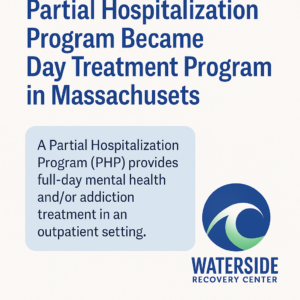For many people seeking treatment in Plymouth or Bristol Counties, the term “partial hospitalization program” can sound clinical, confusing, or even a little intimidating. What exactly does “partial hospitalization” mean? Is it medical? Is it mental health? Is it inpatient?
At Waterside Recovery, we’ve adopted the more human-centered term “Day Treatment Program” because it better matches both what we offer—and what people are really searching for when they need help.
This blog explains where the term “Partial Hospitalization Program” comes from, why many centers have shifted to “Day Treatment,” and what that change means for people considering recovery.
What Is a Partial Hospitalization Program (PHP)?
A Partial Hospitalization Program (PHP) is a structured mental health and/or addiction treatment program that provides full-day therapeutic services without requiring an overnight stay. Clients typically attend 5 to 6 hours per day, 5 days a week.
PHPs include:
- Individual therapy
- Group therapy
- Psychiatric care
- Medication management
- Case management support
Despite the name, there is no hospitalization involved. PHPs are outpatient programs—intensive ones—but not inpatient or residential care.
That’s where the confusion begins.
Why the Term “Partial Hospitalization” Creates Barriers
The term “partial hospitalization” is a carryover from insurance and medical systems. It was originally used to define a level of care—one step down from inpatient hospitalization, and one step up from standard outpatient therapy.
But for many people outside the clinical world, “partial hospitalization” implies something more extreme or medical than what PHPs actually are.
If you’re already scared, unsure, or new to treatment, the word “hospitalization” can be enough to stop you from calling.
Changing the language changes that moment.
Why “Day Treatment Program” Makes More Sense
“Day Treatment Program” is the same level of care as a PHP—but the phrase is softer, clearer, and easier to understand.
When you hear “day treatment,” you know what to expect:
- You go during the day
- You return home at night
- It’s structured, supportive, and immersive—but not residential
For someone taking that brave first step into recovery, that difference in language can mean everything. It lowers the barrier to entry. It feels more approachable. And it centers the experience—not the medical classification.
Why Massachusetts Providers Are Leading This Language Shift
In Plymouth and Bristol Counties, we’ve seen a growing shift toward using “Day Treatment” in place of “PHP”—and for good reason.
Massachusetts residents are savvy, but they also deserve clarity. Many have tried outpatient therapy that didn’t feel like enough. Others are unsure if they “qualify” for something more intensive. Still others are scared by hospital-based language.
By aligning our language with what people actually search for and feel safe approaching, treatment centers like Waterside Recovery are making it easier for people to say yes to help.
This shift also allows us to:
- Normalize seeking care before crisis
- Offer trauma-informed, nonjudgmental intake processes
- Invite people into treatment with confidence, not confusion

What Day Treatment Looks Like at Waterside Recovery
At Waterside Recovery, our Day Treatment Program (formerly called PHP) provides a highly structured environment for healing—without the need for overnight care.
Here’s what a typical day might include:
- Morning check-in and mindfulness
- Group therapy sessions focused on skills, trauma, and emotion regulation
- Individual therapy
- Case management or discharge planning
- Medication support if needed
- Recovery-based wellness activities (like movement, creative arts, or nutrition)
This level of care is ideal if:
- Outpatient therapy hasn’t been enough
- You’ve recently left inpatient care and want strong step-down support
- You’re struggling with your mental health and need more structure than weekly therapy provides
Importantly, you don’t need to know whether it’s the “right level of care” before calling. We’ll talk with you, get to know your situation, and guide you to what fits.
Why Language Matters in Mental Health and Addiction Treatment
When people are in crisis—or even just unsure if they belong in treatment—language shapes their decisions. It tells them what to expect. It shows them whether they’ll be judged or supported. It builds—or breaks—trust.
At Waterside Recovery, we don’t just change terminology for SEO. We change it to reflect our values:
- Clarity: People should know what they’re signing up for.
- Compassion: No one should feel intimidated just by a program name.
- Access: Everyone deserves language that meets them where they are.
Calling something a “Day Treatment Program” doesn’t change the level of care. But it does change how it feels to reach out.
FAQ: Understanding Day Treatment in Massachusetts
Is a Day Treatment Program the same as a Partial Hospitalization Program?
Yes. These terms describe the same level of care. “Day Treatment” is simply more approachable language, especially for people new to recovery.
Do insurance companies still call it PHP?
Yes. Insurance typically authorizes care under the term “Partial Hospitalization Program.” At Waterside Recovery, we handle the insurance language for you.
Is day treatment inpatient or outpatient?
It’s outpatient. You attend during the day and return home in the evening.
How long do people stay in day treatment?
Length of stay varies. Some people benefit from 2–4 weeks, others may need longer. We work with you to build a plan based on your goals and needs.
Do I have to be “ready” to commit before I call?
Not at all. Our job is to help you figure out if this level of care is right for you. No pressure. Just a conversation.
Ready to Take the First Step?
If you’re in Plymouth or Bristol County and wondering if day treatment might help—you’re not alone. Whether you’ve tried therapy before or this is your first time seeking care, you deserve clarity, compassion, and support.
Call Waterside Recovery at (866) 671-8620.
We’ll meet you where you are—and help you find the next step forward.


